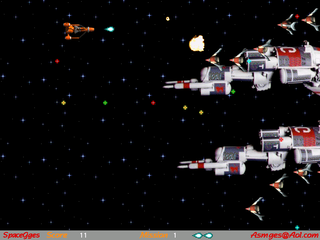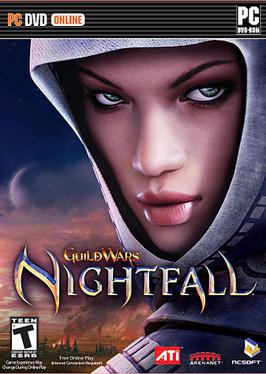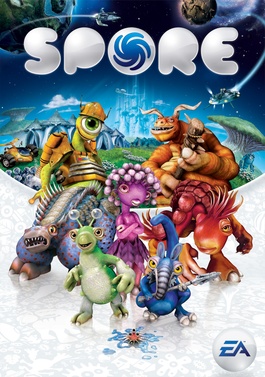
A video game genre is an informal classification of a video game based on how it is played rather than visual or narrative elements. This is independent of setting, unlike works of fiction that are expressed through other media, such as films or books. For example, a shooter game is still a shooter game, regardless of where or when it takes place. A specific game's genre is open to subjective interpretation. An individual game may belong to several genres at once.
Player versus player (PvP) is a type of multiplayer interactive conflict within a game between human players. This is often compared to player versus environment (PvE), in which the game itself controls its players' opponents. The terms are most often used in games where both activities exist, particularly MMORPGs, MUDs, and other role-playing video games, to distinguish between gamemodes. PvP can be broadly used to describe any game, or aspect of a game, where players compete against each other. PvP is often controversial when used in role-playing games. In most cases, there are vast differences in abilities between players. PvP can even encourage experienced players to immediately attack and kill inexperienced players. PvP is often referred to as player killing in the cases of games which contain, but do not focus on, such interaction.
Guild Wars is an online role-playing game franchise developed by ArenaNet and published by NCSOFT. The games were critically well received and won many editor's choice awards, as well as awards such as Best Value, Best Massively Multiplayer Online Role-Playing Game (MMORPG), and Best Game. Guild Wars was noted for being the "first major MMO to adopt a business model not based on monthly subscription fees", its instanced approach to gameplay, and the quality of the graphics and play for computers with low specifications. In April 2009, NCSoft announced that 6 million units of games in the Guild Wars series had been sold. The sequel and fourth major entry into the series, Guild Wars 2, was announced in March 2007 and released on August 28, 2012. It features updated graphics and gameplay mechanics, and continues the original Guild Wars tradition of no subscription fees. The Guild Wars series had sold 11.5 million copies by August 2015

NetDevil Ltd. was an American developer of massively multiplayer online games, based in Louisville, Colorado and owned by Gazillion Entertainment.
Cooperative video game, often abbreviated as co-op, is a video game that allows players to work together as teammates, usually against one or more non-player character opponents (PvE).

Jumpgate: The Reconstruction Initiative is a MMORPG in a science fiction setting for the PC, released in North America on September 26, 2001, by NetDevil (developer) and 3DO (publisher). However, only months after 3DO released the game to stores, their contract with NetDevil was broken or cancelled. NetDevil then hired Themis Group to provide technical support and provide in-game events.

Fantasy Earth Zero was a 2006 massively multiplayer online role-playing game developed for Microsoft Windows. Originally developed by Puraguru and Multiterm under the title Fantasy Earth: The Ring of Dominion, it was released by Square Enix as a paid product through its PlayOnline service. It relaunched under Gamepot as a free game, and was later handled by developer SoftGear and publisher Square Enix. Under the premise of a world where rival kingdoms engage in frequent conflicts, players choose an allied kingdom and fight against each other in groups of up to fifty players. The game closed down in September 2022.

Auto Assault was a massively multiplayer online game, developed by NetDevil and published by NCSOFT. It combined vehicular combat with role-playing elements, allowing the player to explore a post-apocalyptic future in customizable cars, motorcycles, semis, and tanks. It took inspiration, in part, from the Mad Max series of films.

Guild Wars Nightfall is a fantasy action role-playing game and the third stand-alone campaign in the Guild Wars series developed by ArenaNet, a subsidiary of NCSOFT corporation. Nightfall was released worldwide on October 27, 2006 after, having been in development alongside Guild Wars Factions since November 2005.
X is a science fiction space trading and combat simulator series created by German developer Egosoft. The series is set in the X-Universe where several races populate a number of worlds connected by jumpgates. The games feature free roaming gameplay with trading, combat, empire building, and missions; leading to the series' phrase: "Trade, Fight, Build, Think". The series, which was launched in 1999 on the Windows platform, consists of five base games: X: Beyond the Frontier, X2: The Threat, X3: Reunion, X Rebirth, and X4: Foundations. X Rebirth introduced a new rendering engine as well as a new plot, one which X4: Foundations now extends the storyline beyond ten years after the events in X Rebirth.

X3: Terran Conflict is a space trading and combat simulator by German developer Egosoft, part of their X series of games. Described as a stand-alone game, based on X3: Reunion, it boasts new plot lines, features and assets. It was first released in October 2008 for the European market and Steam.
World of Warcraft, or WoW, is set in a fictional universe, its primary setting being the planet of Azeroth. The first expansion, The Burning Crusade, introduced a second planet, Outland. Wrath of the Lich King and Cataclysm expanded upon Azeroth and respectively added Northrend, the frigid northern continent of Azeroth, and drastically changed various other continents by destroying some and unveiling new ones. The next expansion, Mists of Pandaria, added Pandaria, the southern continent previously hidden behind a perennial mist cover. Warlords of Draenor introduced the planet of Draenor, a version of Outland in a different timeline before its partial destruction. The Legion expansion took adventurers to the Broken Isles, an island chain near the Maelstrom in the middle of the Great Sea, and the damaged planet Argus, the headquarters of the Burning Legion. The seventh expansion, Battle for Azeroth, added two new island continents to the center of Azeroth: Kul Tiras and Zandalar. The latest expansion, Shadowlands, introduced the eponymous Shadowlands, a realm composed of five major zones: Bastion, Maldraxxus, Ardenweald, Revendreth, and the Maw.
A space flight simulation is a genre of flight simulator video games that lets players experience space flight to varying degrees of realism. Common mechanics include space exploration, space trade and space combat.

Spore is a 2008 life simulation real-time strategy God game developed by Maxis and published by Electronic Arts for Microsoft Windows and Mac OS X. Designed by Will Wright, it covers many genres including action, real-time strategy, and role-playing games. Spore allows a player to control the development of a species from its beginnings as a microscopic organism, through development as an intelligent and social creature, to interstellar exploration as a spacefaring culture. It has drawn wide attention for its massive scope, and its use of open-ended gameplay and procedural generation. Throughout each stage, players are able to use various creators to produce content for their games. These are then automatically uploaded to the online Sporepedia and are accessible by other players for download.

Endless Ages was a 3D MMOFPS with role-playing elements that was developed by the American game development studio Avaria Corporation. It was the first multiplayer online game to merge first-person shooting and role-playing when it was released for beta in Spring 2001. The game saw its official commercial release on July 1, 2003.
Realm versus Realm (RvR) is a type of player versus player (PvP) gameplay in massively multiplayer online role-playing games (MMORPGs) where the player base is divided over multiple preset realms that fight each other over game assets. This differs from normal Player versus Player combat in that Realm versus Realm usually involves a combat-based game, as opposed to one where sporadic Player versus Player combat occurs. In this context, "realm" generally means a geographic territory or political affiliation.

Sinistar: Unleashed is a 1999 action space shooter video game for Microsoft Windows. It was designed by Marc Michalik and Walter Wright and developed at GameFX, a small studio composed of former members of Looking Glass Studios. Originally titled Out of the Void, development of the project began in 1997 and had no relationship with the Sinistar franchise. After licensing the franchise from Midway Games that year, GameFX shifted the focus of the game and developed it as a sequel to the original Sinistar, which was released by Williams in 1982.

Destiny is an online-only multiplayer first-person shooter video game developed by Bungie and previously published by Activision. Destiny is now self-published by Bungie after separating from Activision in 2019. It was released worldwide on September 9, 2014, for the PlayStation 3, PlayStation 4, Xbox 360, and Xbox One consoles. Destiny marked Bungie's first new console franchise since the Halo series, and it was the first game in a ten-year agreement between Bungie and Activision. Set in a "mythic science fiction" world, the game features a multiplayer "shared-world" environment with elements of role-playing games. Activities in Destiny are divided among player versus environment (PvE) and player versus player (PvP) game types. In addition to normal story missions, PvE features three-player "strikes" and six-player raids. A free roam patrol mode is also available for each destination which feature public events. PvP features objective-based modes, as well as traditional deathmatch game modes.

Destiny 2 is a free-to-play online-only multiplayer first-person shooter video game developed by Bungie. It was originally released as a pay to play game in 2017 for PlayStation 4, Xbox One, and Windows. It became free-to-play, utilizing the games as a service model, under the New Light title on October 1, 2019, followed by the game's release on Stadia the following month, and then PlayStation 5 and Xbox Series X/S platforms in December 2020. The game was published by Activision until December 31, 2018, when Bungie acquired the publishing rights to the franchise. It is the sequel to 2014's Destiny and its subsequent expansions.

Master X Master (MXM) was a multiplayer online battle arena (MOBA) video game developed and published by NCsoft.













